Bes vs. Be: What's the Difference?
By Aimie Carlson & Harlon Moss || Updated on May 22, 2024
"Bes" is an Egyptian deity associated with protection and childbirth, while "be" is a verb in English indicating existence or identity.

Key Differences
"Bes" is an ancient Egyptian deity known for his role in protection and childbirth. Represented as a dwarf with a lion-like mane, Bes was believed to ward off evil spirits and ensure safety. "Be," on the other hand, is a fundamental verb in the English language used to indicate existence, identity, or state of being, such as in the phrases "I am" or "you are."
While Bes symbolizes a protective figure in mythology, "be" functions as an auxiliary and main verb in grammar. Bes is part of cultural history and mythology, revered in ancient rituals and depicted in amulets and temple carvings. In contrast, "be" is essential in constructing sentences and expressing various grammatical tenses and moods.
The use of Bes in ancient texts and art highlights its cultural significance, offering insights into Egyptian beliefs and practices. Conversely, the verb "be" is ubiquitous in everyday language, essential for communication and understanding in English.
Whereas Bes is a subject of archaeological and historical study, "be" is a subject of linguistic analysis. Scholars explore Bes in the context of religion and mythology, while linguists examine "be" to understand sentence structure and language mechanics.
Comparison Chart
Definition
Egyptian deity of protection and childbirth
Verb indicating existence or identity
ADVERTISEMENT
Usage
Mythology and historical contexts
Grammar and daily language
Representation
Depicted as a dwarf with lion-like features
Forms like "am," "is," "are"
Function
Protective figure in ancient beliefs
Expresses states, identities, and actions
Study Focus
Archaeology, mythology
Linguistics, grammar
Bes and Be Definitions
Bes
An Egyptian deity of protection.
Bes was often invoked during childbirth for protection.
ADVERTISEMENT
Be
To have a specified quality.
She must be kind.
Bes
A figure in Egyptian religion associated with music and dance.
Festivals included dances to honor Bes.
Be
To belong or relate to.
The book may be his.
Bes
A dwarf-like figure in ancient Egyptian mythology.
Temples often featured carvings of Bes.
Be
To indicate identity or role.
He is a doctor.
Bes
A guardian against evil spirits.
Amulets of Bes were worn for protection.
Be
To exist in actuality; have life or reality
I think, therefore I am.
Bes
Protector of households in ancient Egypt.
Bes statues were placed in homes for safety.
Be
To occupy a specified position
The food is on the table.
Bes
The Egyptian god of music and revelry and the guardian deity of women in labor, often depicted as a dwarf.
Be
To remain in a certain state or situation undisturbed, untouched, or unmolested
Let the children be.
Bes
Present tense inflected form of be: am or are.
Be
To take place; occur
The test was yesterday.
Bes
A bronze coin of the Roman Republic, worth two thirds of an as.
Be
To go or come
Have you ever been to Italy? Have you been home recently?.
Be
To equal in identity
“To be a Christian was to be a Roman” (James Bryce).
Be
To have a specified significance
A is excellent, C is passing. Let n be the unknown quantity.
Be
To belong to a specified class or group
The human being is a primate.
Be
To have or show a specified quality or characteristic
She is witty. All humans are mortal.
Be
To seem to consist or be made of
The yard is all snow. He is all bluff and no bite.
Be
To belong; befall
Peace be unto you. Woe is me.
Be
Used with the past participle of a transitive verb to form the passive voice
The mayoral election is held annually.
Be
Used with the present participle of a verb to express a continuing action
We are working to improve housing conditions.
Be
Used with the infinitive of a verb to express intention, obligation, or future action
She was to call before she left. You are to make the necessary changes.
Be
Used with the past participle of certain intransitive verbs to form a perfect tense
Those days are gone. Let me know when you are finished.
Be
To exist; to have real existence, to be alive.
The Universe has no explanation: it just is.
Be
To exist.
There is just one woman in town who can help us.
Be
(intransitive) To occupy a place.
The cup is on the table.
Be
(intransitive) To occur, to take place.
When will the meeting be?
Be
Elliptical form of "be here", "go to and return from" or similar, also extending to certain other senses of "go".
The postman has been today, but my tickets have still not yet come.
I have been to Spain many times.
We've been about twenty miles.
I have terrible constipation – I haven't been for several days.
They have been through a great deal of trouble.
Be
(copulative) Used to indicate that the subject and object are the same.
Knowledge is bliss.
Hi, I’m Jim.
Be
Used to indicate that the values on either side of an equation are the same.
3 times 5 is fifteen.
Be
(copulative) Used to indicate that the subject is an instance of the predicate nominal.
A dog is an animal.
Dogs are animals.
Be
(copulative) Used to indicate that the subject plays the role of the predicate nominal.
François Mitterrand was president of France from 1981 to 1995.
Be
(copulative) Used to indicate that the subject has the qualities described by an adjective.
The sky is blue.
Father, if thou be willing, remove this cup from me: nevertheless not my will, but thine, be done. (Luke 22:42)
Be
(copulative) Used to indicate that the subject has the qualities described by a noun or noun phrase.
The sky is a deep blue today.
Be
(auxiliary) Used to form the passive voice.
The dog was saved by the boy.
Be
(auxiliary) Used to form the continuous aspect.
The woman is walking.
I shall be writing to you soon.
We liked to chat while we were eating.
Be
Used to form the perfect aspect with certain intransitive verbs; this was more common in archaic use, especially with verbs indicating motion. "He is finished", and "He is gone" are common, but "He is come" is archaic.
Be
Used to express future action as well as what is due to, intended to, or should happen.
They are to be married next month.
They are to stay here until I return.
They are not to be blamed.
How are they to get out of this mess?
I am to leave tomorrow.
I would drive you, were I to obtain a car.
Be
(copulative) Used to link a subject to a measurement.
This building is three hundred years old.
I am 75 kilograms.
He’s about 6 feet tall.
Be
Used to state the age of a subject in years.
I’m 20 (years old).
Be
Used to indicate the time of day.
It is almost eight (o’clock).
It’s 8:30 [read eight-thirty] in Tokyo.
What time is it there? It’s night.
Be
Used to indicate passage of time since the occurrence of an event.
It has been three years since my grandmother died. (similar to "My grandmother died three years ago", but emphasizes the intervening period)
It had been six days since his departure, when I received a letter from him.
Be
Used to link two noun clauses, the first of which is a day of the week, recurring date, month, or other specific time (on which the event of the main clause took place), and the second of which is a period of time indicating how long ago that day was.
I saw her Monday was a week: I saw her a week ago last Monday (a week before last Monday).
On the morning of Sunday was fortnight before Christmas: on the morning of the Sunday that was two weeks before the Sunday prior to Christmas.
Be
Used to indicate weather, air quality, or the like.
It is hot in Arizona, but it is not usually humid.
Why is it so dark in here?
Be
To exist or behave in a certain way.
"What do we do?" "We be ourselves."
Why is he being nice to me?
Be
To tend to do, often do; marks the habitual aspect.
Be
. Also found in compounds, especially oaths, e.g. begorra.
Be
To exist actually, or in the world of fact; to have existence.
To be contents his natural desire.
To be, or not to be: that is the question.
Be
To exist in a certain manner or relation, - whether as a reality or as a product of thought; to exist as the subject of a certain predicate, that is, as having a certain attribute, or as belonging to a certain sort, or as identical with what is specified, - a word or words for the predicate being annexed; as, to be happy; to be here; to be large, or strong; to be an animal; to be a hero; to be a nonentity; three and two are five; annihilation is the cessation of existence; that is the man.
Be
To take place; to happen; as, the meeting was on Thursday.
Be
To signify; to represent or symbolize; to answer to.
The field is the world.
The seven candlesticks which thou sawest are the seven churches.
Be
A light strong brittle gray toxic bivalent metallic element
Be
Have the quality of being; (copula, used with an adjective or a predicate noun);
John is rich
This is not a good answer
Be
Be identical to; be someone or something;
The president of the company is John Smith
This is my house
Be
Occupy a certain position or area; be somewhere;
Where is my umbrella?
The toolshed is in the back
What is behind this behavior?
Be
Have an existence, be extant;
Is there a God?
Be
Happen, occur, take place;
I lost my wallet; this was during the visit to my parents' house
There were two hundred people at his funeral
There was a lot of noise in the kitchen
Be
Be identical or equivalent to;
One dollar equals 1,000 rubles these days!
Be
Form or compose;
This money is my only income
The stone wall was the backdrop for the performance
These constitute my entire belonging
The children made up the chorus
This sum represents my entire income for a year
These few men comprise his entire army
Be
Work in a specific place, with a specific subject, or in a specific function;
He is a herpetologist
She is our resident philosopher
Be
Represent, as of a character on stage;
Derek Jacobi was Hamlet
Be
Spend or use time;
I may be an hour
Be
Have life, be alive;
Our great leader is no more
My grandfather lived until the end of war
Be
To remain unmolested, undisturbed, or uninterrupted -- used only in infinitive form;
Let her be
Be
Be priced at;
These shoes cost $100
Be
To exist or live.
I want to be a writer.
Be
To take place or occur.
The meeting will be at noon.
FAQs
What is the primary function of the verb "be"?
The verb "be" is used to indicate existence, identity, or state of being.
What is Bes in Egyptian mythology?
Bes is a deity associated with protection, childbirth, and household safety in ancient Egyptian mythology.
How is Bes typically depicted?
Bes is often depicted as a dwarf with a lion-like mane, representing strength and ferocity.
How is "be" used in a sentence?
"Be" can be used in sentences like "I am happy" or "They were playing."
Is Bes a common figure in Egyptian artifacts?
Yes, Bes frequently appears in amulets, statues, and temple carvings.
How does Bes differ from other Egyptian gods?
Bes is unique in his protective role and dwarf-like appearance, unlike other more regal deities.
Is "be" used differently in different tenses?
Yes, "be" changes form depending on the tense, such as "am" in present tense and "was" in past tense.
What role did Bes play in ancient Egyptian households?
Bes was considered a protector of homes, often invoked to ward off evil spirits and ensure family safety.
Can "be" function as an auxiliary verb?
Yes, "be" can act as an auxiliary verb in forming continuous and passive tenses.
Why is "be" important in English grammar?
"Be" is essential for constructing sentences and expressing various tenses and moods.
What are some common forms of "be"?
Common forms include "am," "is," "are," "was," and "were."
Does "be" have any irregular forms?
Yes, "be" is irregular with forms like "am," "is," "are," "was," and "were."
What is the cultural significance of Bes?
Bes provides insights into ancient Egyptian beliefs about protection, family, and domestic life.
Can "be" express future actions?
Yes, with constructions like "will be" for future tense.
What linguistic function does "be" serve?
"Be" serves as a copula, linking the subject to a complement, and as an auxiliary in complex tenses.
What does it mean to "be" something?
To "be" something means to exist as that thing or to have that identity.
What rituals involved Bes in ancient Egypt?
Rituals often included invoking Bes for childbirth protection and household safety.
Is Bes mentioned in any famous Egyptian texts?
Yes, Bes is mentioned in various texts and inscriptions, highlighting his importance in mythology.
Is Bes still worshipped today?
Bes is not commonly worshipped today but remains a significant figure in the study of ancient Egyptian culture.
How does "be" differ from other verbs?
"Be" is unique in its role as both a main and auxiliary verb and its irregular conjugations.
About Author
Written by
Aimie CarlsonAimie Carlson, holding a master's degree in English literature, is a fervent English language enthusiast. She lends her writing talents to Difference Wiki, a prominent website that specializes in comparisons, offering readers insightful analyses that both captivate and inform.
Co-written by
Harlon MossHarlon is a seasoned quality moderator and accomplished content writer for Difference Wiki. An alumnus of the prestigious University of California, he earned his degree in Computer Science. Leveraging his academic background, Harlon brings a meticulous and informed perspective to his work, ensuring content accuracy and excellence.































































